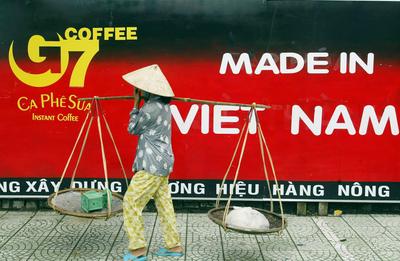The coffee industry is a very important part of Vietnam’s agricultural sector. It contributes to Vietnam’s GDP, creates more jobs and helps socio-economic development in the Tay Nguyen area.
But Vietnam’s coffee bean price fluctuates depending on crops, weather, quantity and supply and demand. Export and domestic prices also follow international market fluctuations. Vietnam’s export price is lower than that of other exporting countries because the quality of Vietnamese coffee beans is neither high nor stable, and green coffee beans are exported without a trademark. The main reason for the lower quality is that farmers often pluck all the coffee berries from the branches when harvesting, so there are more green berries than ripe berries. Still, the gap between Vietnamese export prices and international export prices is narrowing.
Vietnam’s production for 2013/14 is forecast at a record 28.5 million bags, up two million on the previous year. And coffee bean exports are forecast to increase by 900,000 bags to 24.5 million.
Vietnam’s export product range includes green coffee beans, roasted coffee and instant coffee. 90 per cent of Vietnamese coffee produced is Robusta and 10 percent Arabica. As Arabica is more difficult to grow in Vietnam than Robusta because of unsuitable altitudes, it is not planted on a large scale, although it is twice the price of Robusta. Robusta coffee is popular in Vietnam’s southern provinces, while Arabica coffee is mainly planted in the mountainous areas of northern Vietnam.
The government has implemented various policies to encourage the export of coffee. These include value added tax refunds on coffee exports, extending export credit repayment and the establishment of a price stability fund operated by the Vietnam Coffee-Cocoa Association (VICOFA). But these activities seem to be ineffective at dealing with the negative fluctuations in world price. According to Mr Do Ha Nam, CEO of Vietnam’s biggest coffee exporter Intimex, the pertinent weakness of the coffee industry is its inability to deal with price fluctuation. A shortage of financial resources and a low level of processing cause this weakness. Currently, the coffee industry’s total outstanding debt is US$1.2 million.
VICOFA is an association of Vietnam’s main coffee exporters and is an important player in Vietnam’s coffee industry. It operates a price stability fund and provides a market information system for its members. Also, the association has annual coffee festivals either in Tay Nguyen provinces or Hanoi to promote domestic consumption. These activities have contributed to the achievements of the coffee industry in recent years. But there are concerns that VICOFA aims only to protect its members — domestic enterprises rather than the 60,000 coffee growers that account for 1.83 per cent of the national workforce.
In 2013, the government established Vietnam’s Coffee Coordinating Board. The board comprises representatives from governmental agencies, VICOFA, processors and farmers. Including farmers is a good signal that the government is paying attention to them. But among 15 members, only two are growers, four from processing enterprises and eight from the government (ministries and provinces).
The presence of foreign enterprises on the board is expected to bring about new developments in coffee marketing and price determination. Still, the development of Vietnam’s coffee industry will depend on the balance of benefits between processing enterprises — especially foreign enterprises such as Nestle — and small coffee growers. But whether the new Coffee Coordinating Board will contribute to this objective is still a big question.
Pham Thu Huong is Associate Professor and Vice Dean of the Postgraduate Faculty at Foreign Trade University, Vietnam.
Dao Ngoc Tien is Manager of Academic and Research Affairs, Foreign Trade University, Vietnam.

